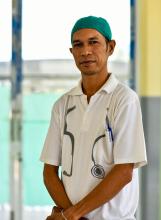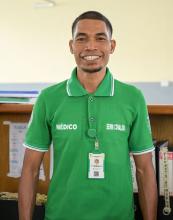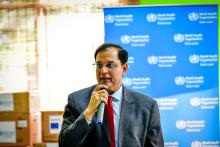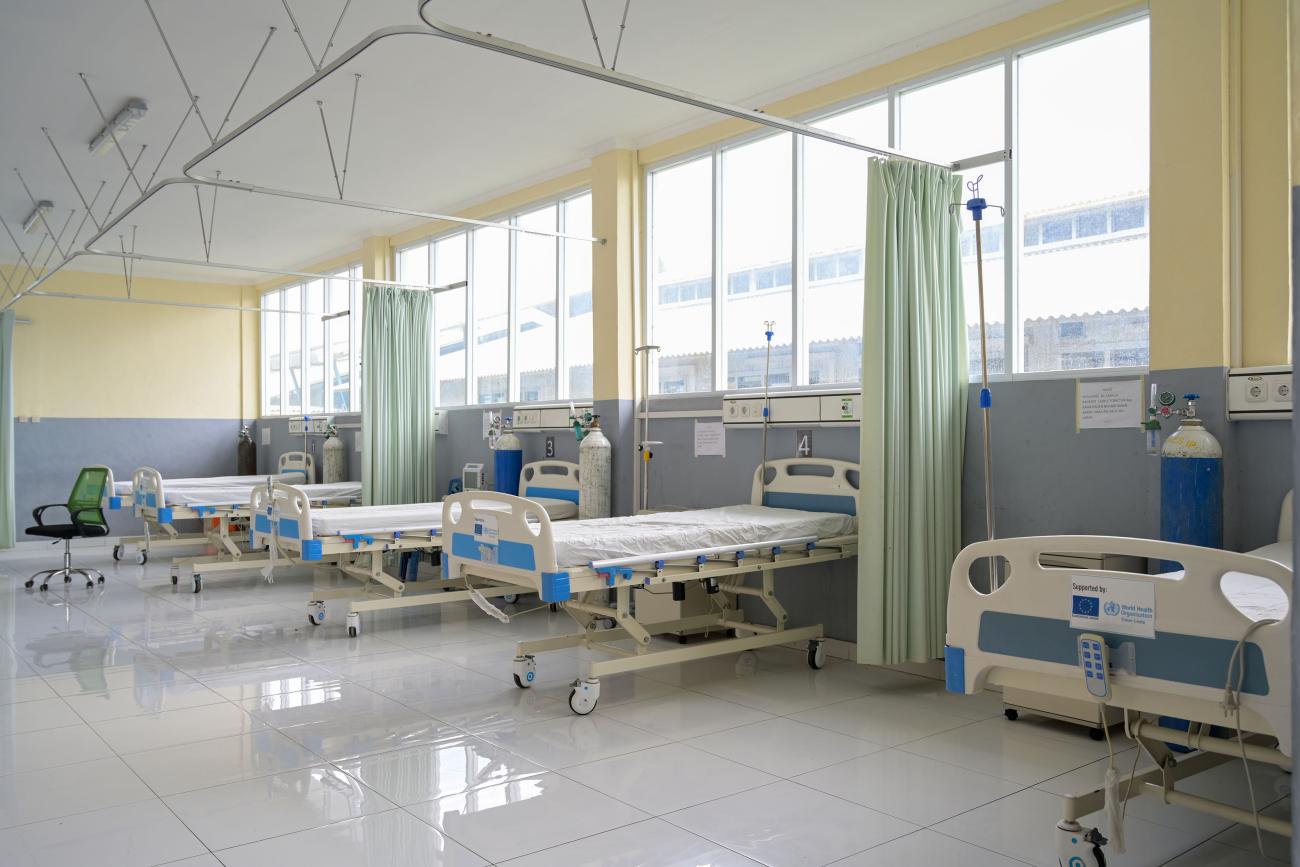5 referral hospitals in Timor-Leste's remote mountainous regions have improved infrastructure and equipment and better trained staff to treat patients and save lives in emergency and critical care.
Hospitals with advanced emergency and critical healthcare infrastructure and equipment and trained health workers support progress towards UHC, ensuring accessible services and reducing the financial burden for patients.
Almost 500 patients have benefitted so far. Over 1000 health workers were trained in basic life support, over 125 emergency care personnel were trained in emergency and critical care, and over 200 health workers were trained in basic emergency care.
The Ministry of Health, with support from WHO, established and equipped High Dependency Units in 5 referral hospitals and trained health workers in emergency and critical care.

It was our first time performing a thrombolysis procedure. It helped that the [Suai Referral] hospital had a functional High Dependency Unit, and that I had undergone multiple emergency and critical care trainings which gave me the confidence to handle such a case. I no longer panic when receiving critical patients. Previously, we would simply transfer patients to the national hospital in Dili.

I feel I am extremely fortunate to have received the timely emergency care that saved my life.

Advanced healthcare infrastructures and adequate and competent healthcare workers are fundamental to achieving UHC. By enhancing infrastructure in referral hospitals, establishing Simulation-Based Skills Centers, and equipping healthcare providers with advanced skills, the burden of out-of-pocket expenditure on patients referred due to inadequate facilities can be significantly reduced.
COVID-19 was a stark reminder to all of us about how important strong cooperation is for good health to prevail. In Timor-Leste, partnership between the Ministry of Health, WHO and the European Union allowed for improved vaccination rates, more hospital beds, some intensive care and, perhaps most importantly, helped to outline a path toward not just better but good health services. I am proud that the EU is contributing to this. Are we now there? No, we are not. Progress was made and now a significant effort will still be needed to improve and consolidate a quality health system that serves all Timorese equally.
THE LONG READ
"It was our first time performing a thrombolysis procedure," said Dr Augusto Adelaide Pereira, an emergency physician at Suai Referral Hospital, located over 170 km away from Timor-Leste’s capital, Dili. He was referring to the case of a 41-year-old man who arrived at the hospital complaining of severe chest pain and shortness of breath while out for an evening jog. A swift diagnosis of a heart attack, followed by timely treatment in the hospital’s High Dependency Unit, proved to be a timely life-saving intervention.
“It helped that the hospital had a functional High Dependency Unit and that I had undergone multiple emergency and critical care trainings which gave me the confidence to handle such a case,” said Dr Augusto.
"I feel I am extremely fortunate to have received the timely emergency care that saved my life," said Vitorino Sequeira Magno, the patient who suffered the heart attack, who now works as the Chief of the ambulance service in Suai.
Suai Referral Hospital is one of five referral hospitals in Timor-Leste's remote mountainous regions. Patients in need of higher levels of care were until recently transferred to the national hospital in the capital city, Dili. Some travelled for up to 8 hours, well beyond the ‘golden hour’ for timely interventions. When the COVID-19 pandemic hit, there was a clear need to have emergency and critical care services in all secondary care referral hospitals.
With long-standing support from the Universal Health Coverage (UHC) Partnership, WHO recently intensified its collaboration with Timor-Leste's Ministry of Health as a result of lessons learnt from the COVID-19 crisis to provide training, infrastructure, and equipment to support health professionals who need to provide emergency and critical care.

The UHC Partnership assists over 125 countries in accelerating progress to achieve UHC through funding provided by the European Union, the Grand Duchy of Luxembourg, Irish Aid, the French Ministry for Europe and Foreign Affairs, the Government of Japan - Ministry of Health, Labour and Welfare, the United Kingdom - Foreign, Commonwealth & Development Office, Belgium, Canada and Germany.
Strengthening infrastructure and capacities
Before the COVID-19 pandemic the country had only 6 Intensive Care Unit beds with ventilators, all located in Dili's national hospital. Following support from the UHC Partnership to improve emergency preparedness, efforts to establish High Dependency Units in referral hospitals began amid the pandemic and open spaces were identified at each of the hospitals, making way for meticulously designed buildings.
WHO provided technical guidance, logistical assistance, and competency building for healthcare workers involved in critical and emergency care and facilitated the provision of essential medicines, equipment, and consumables needed to operationalize the units.
Hospitals established isolation rooms for highly infectious or immunocompromised patients and equipped High Dependency Units with essential airway breathing devices, multipara monitors, invasive and non-invasive ventilators, and other critical care equipment.
Trained healthcare staff are essential for the optimal functioning of High Dependency Units. WHO provided technical assistance to develop the Emergency and Critical Care training programme and Basic Life Support and Basic Emergency Care courses tailored to the country’s context.
As of today, more than 1000 healthcare workers including doctors, paramedics, and nursing staff have undergone Basic Life Support training. Multiple sessions of the Emergency and Critical Care Continuous Professional Development training were rolled out for emergency care personnel, and over 125 individuals have been trained so far.
The Basic Emergency Care module was extended to High Dependency Unit and Intensive Care Unit staff and over 200 healthcare workers have been trained, with 17 designated as master trainers.

Dr Augusto from Suai Referral Hospital was a recipient of capacity-building efforts and is also a master trainer. He credits the trainings with his evolution as an improved emergency care physician. Although working at Suai Referral Hospital since 2017, it has only been two years since he started handling severe trauma, heat strokes, and heart attacks.
“I no longer panic when receiving critical patients. Previously, we would simply transfer patients to the national hospital in Dili,” said Dr Augusto.
Collectively, the 5 referral hospitals have attended to over 500 patients as of March 2023.
A sustainable skills building approach
Timor-Leste is Asia’s youngest nation with a population of around 1.3 million. The country’s health systems and medical education is still developing. While the initial cohorts of Timorese doctors were trained in Cuba, the past decade has seen doctors graduating from the national university in Dili, Universidade Nacional Timor Lorosa'e, with a Cuban curriculum and Cuban and Timorese teachers.
Despite a gradual increase in the number of Timorese doctors, the country continues to face a shortage of skilled and competent human resources with only 25 healthcare professionals per 10 000 population - significantly below the global Human Resources for Health (HRH) strategies’ indicative threshold of 44.5 physicians, nurses and midwives per 10 000 population.
In 2023 WHO, through the UHC Partnership, provided technical support and guidance to the Ministry of Health to establish the first Simulation-Based Skills Centre in Baucau municipality. This facility allows doctors, nurses, and medical students to practice on advanced mannequins simulating human anatomy. Over 100 healthcare providers have undergone training at the skills center to date.

Reducing the financial burden for patients
Health services in Timor-Leste are provided free of charge at the point of delivery, and Timor-Leste has one of the lowest out-of- pocket expenditure rates among low- and middle-income countries. Despite this, transportation to hospitals is not necessarily provided by government-run ambulance services resulting in significant financial burdens for patients, particularly in rural areas. This financial strain sometimes leads to the refusal of continuing treatment or early discharge of patients.
“Advanced healthcare infrastructures and adequate and competent healthcare workers are fundamental to achieving UHC. By enhancing infrastructure in referral hospitals, establishing Simulation-Based Skills Centers, and equipping healthcare providers with advanced skills, the burden of out-of-pocket expenditure on patients referred due to inadequate facilities can be significantly reduced,” said Dr Arvind Mathur, WHO Representative to Timor-Leste.

Cooperation for the future
“COVID-19 was a stark reminder to all of us about how important strong cooperation is for good health to prevail. In Timor-Leste, partnership between the Ministry of Health, WHO and the European Union allowed for improved vaccination rates, more hospital beds, some intensive care and, perhaps most importantly, helped to outline a path toward not just better but good health services. I am proud that the EU is contributing to this. Are we now there? No, we are not. Progress was made and now a significant effort will still be needed to improve and consolidate a quality health system that serves all Timorese equally,” said Mr March Fiedrich, EU Ambassador to Timor-Leste.
Looking ahead, the Government of Timor-Leste recognises the need to enhance referral and transport systems in the health system and to prioritise continuing professional development for emergency and critical care workers. Working with multiple stakeholders, Timor-Leste continues to show its commitment and dedication to make progress towards universal health coverage.
Bolstering health security
In recent years, the Government of Timor-Leste has demonstrated a steadfast commitment to fortifying its healthcare system and bolstering health security measures. This commitment was underscored in 2018 when the nation willingly participated in a Joint External Evaluation (JEE) to assess its capacity for preventing, detecting, and responding to health emergencies. Subsequently, in 2019, Timor-Leste conducted a Simulation Exercise (SimEx) to further refine and evaluate its emergency response systems and protocols, crucial for effectively managing outbreaks and public health crises.
The findings from these evaluations were instrumental in formulating the National Action Plan for Health Security (NAPHS) spanning 2020-2024. Emphasizing a One Health approach and a comprehensive whole-of-government strategy, NAPHS serves as a testament to Timor-Leste's proactive stance on health security. Additionally, the completion of the State Party Self-Assessment Annual Reporting Tool (SPAR) annually from 2018 to 2022 underscores the nation's commitment to monitoring and improving its ability to detect, assess, and respond to both domestic and international health threats, including the challenges posed by the COVID-19 pandemic
